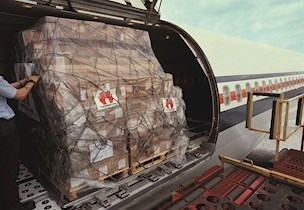FORCE Technology examines the environmental and health profiles of stone wool
A life cycle assessment and a risk assessment performed by FORCE Technology, shows that Rockwool is competitive both environmentally and health wise.
At Rockwool International they know better than most how important it is to insulate buildings.
These days, almost 70% of the energy consumption of European households is spent on heating, although tremendous savings can be made by optimising insulation - as much as 2/3 of current energy consumption.
Insulation products made of stone wool, such as that produced by Rockwool factories throughout most of the world, have for some years been criticised both for having an impact on the environment during manufacture and being a danger to the health of those people who install the products.
Rockwool International has during the same period worked to improve the environmental and health properties of its products, and wanted to be able to tell its customers and other decision-makers about the results.
FORCE Technology in charge of the studies
In order to secure the best professional quality for the studies, Rockwool International chose FORCE Technology to take charge of the collection, processing and presentation of the existing knowledge about mineral wool and selected competing products,.
The choice of FORCE Technology to perform the study was made on the basis of the company's many years of experience in the field of environmental health, and because FORCE Technology can do this with a high degree of credibility as an independent organisation.
FORCE technology was given entirely free hands to perform the study in accordance with the best scientific standards.
Life Cycle Assessment
In order to shed light on all aspects, it was decided to perform a life cycle assessment (LCA) of the environmental aspects and a simplified risk evaluation of the work involved in installing insulation materials. In addition to a typical stone wool product, the investigation also included two other insulation products, manufactured from flax and paper wool.
In an LCA, we calculate how great a contribution the product makes to different environmental impact, such as the greenhouse effect, energy consumption, acidification and eutrophication. By examining the broad range of environmental parameters a balanced view of the environmental properties of a product is established. A simplified risk assessment gives additional information on how hazardous a product is and how high an exposure level can be expected in the working environment.
Rockwool is competitive both environmentally and health wise
In short, the results show that stone wool is competitive in terms of both environment and health properties. The calculations show that the overall energy consumption in the manufacture of stone wool is least in comparison to the two other products, whereas paper wool has the best properties in relation to the selected impacts being examined.
With respect to impacts on human health, available studies show that stone wool must be considered the safest choice, because its characteristics are very well documented. It is especially important that the fibers are readily broken down in the lungs and they can therefore not do any damage. It is also important that the amount of dust produced while when installing the product is below the limit values laid down by the Working Environment Service.
Chief engineer Anders Ulf Clausen of Rockwool International says: "We are pleased to have an evaluation of a high professional standard of how our product perform in relation to environment and health aspects. In addition, we are, of course, pleased that stone wool does well compared to other insulation materials. This allows us to focus our work on the area we believe is the most important, i.e. reducing the amount of energy consumed by heating."
Rockwool International A/S manufactures insulation from stone for e.g. buildings, industrial installations, power plants, ships and drilling rigs. The group employs more than 7,400 staff members worldwide.


